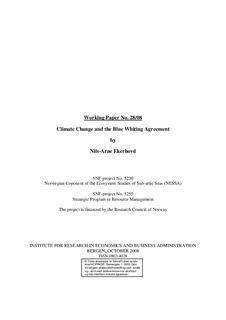| dc.description.abstract | This paper investigates the formation, stability and success of an agreement between the coastal states on the management of the blue whiting fishery under two opposing assumption about the distribution of the stock, based on different climate change scenarios for the Northeast Atlantic Ocean as a result of global warming. Two climate change scenarios for the Northeast Atlantic Ocean are analysed. In one scenario, increased ocean temperature expands the blue whiting’s migration pattern and its area of distribution, making Russia a coastal state with regard to the blue whiting stock in addition to the countries already recognized as such. In this scenario, the stability of the coastal state coalition does not change relative to the Status Quo, i.e., Ekerhovd (2008), although the payoff to the coalition increases when Russia enters. The second scenario looks at the consequences of a colder climate on the distribution of the blue whiting stock. The stock no longer occupies Russian EEZs and Russia is not regarded as a coastal state by the other countries. In this scenario, the stability of the coastal state coalition is severely weakened such that the formation of a coastal state coalition is an even more unlikely outcome compared to Ekerhovd (2008). | en |
